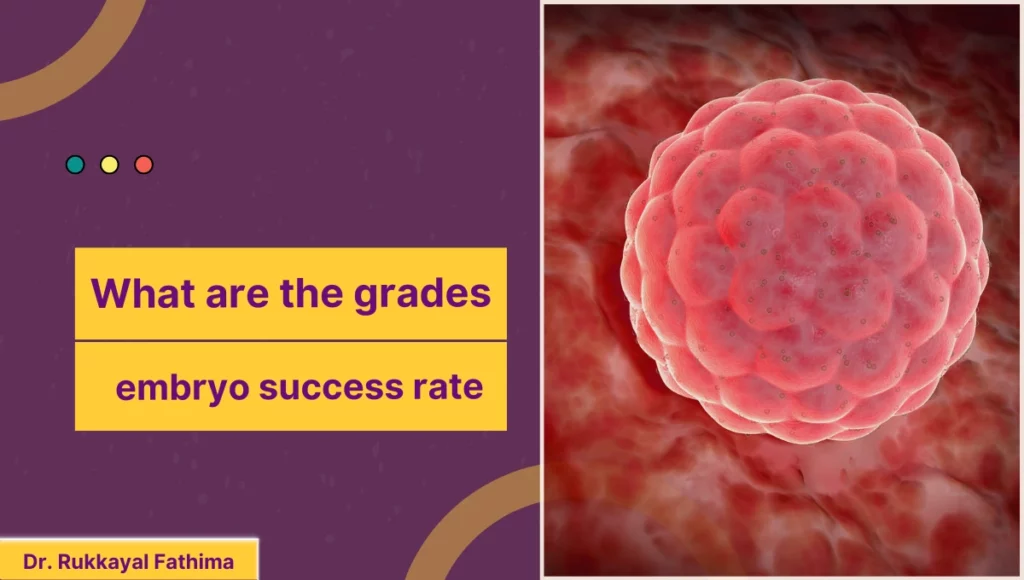Technology has developed immensely, and having your own baby is no longer an issue. There are several infertility treatments that can help you have your own baby. One such effective treatment option is IVF.
In IVF, each of your eggs, sperm, and embryos are analyzed. During the last stage, embryo transfer, only the best eggs are chosen for embryo transfer. Before embryo transfer, these embryos are monitored and graded based on their quality.
In this article, we will discuss the different grades that are allotted to the embryos and how these grades determine the quality and success rate of each embryo.
What factors are considered during embryo grading?
There are several types of grading systems that are used to grade an embryo. Each hospital uses a specific grading system for their convenience. The Grade 1, 2, and 3 grading systems we are going to see today are commonly used to grade embryos in their cleavage stage.
These embryos are graded based on the following factors:
- Number of cells: The cleavage stage is day 2 and day 3 of fertilization. The embryologist will analyze how many cells the embryo has divided into.
- Fragmentation: This is DNA Fragmentation. Your embryologist will use the DNA Fragmentation Index (DFI) to determine fragmentation levels.
- Multinucleation: This analysis is based on how many nuclei are present in the cell membrane.
- Cell size: Your embryologist will analyze whether the embryo cell size if the right one for its stage and whether all the cells are in the same size.
Based on all these factors, your embryologist will grade the embryos into Grades 1, 2, and 3, with Grade 1 being the best and Grade 3 being the worst embryo for a higher success rate.
Let’s look at what each grade entails below.
What is the grade 1 embryo success rate?
For an embryo to be ranked grade 1, it should have the following parameters.
- The embryo and its DNA should have less than 10% fragmentation rate.
- There should be no multinucleation. That is, each cell membrane should only have one nucleus.
- Each cell should be the right size for its specific growth stage, and the size of all cells should be even.
What is the grade 2 embryo success rate?
Below are the parameters for Grade 2 embryos. They have a good but lower success rate and quality than Grade 1 embryos.
- The embryos should only have between 10 and 25% fragmentation rate.
- There should be no multinucleation. That is, each cell membrane should only have one nucleus.
- Most cells should be the right size for their specific growth stage, and the size of most cells should be even.
What is the grade 3 embryo success rate?
These embryos are of the lowest quality, and they have the least chance of success than other embryos. These embryos have the following characteristics.
- The fragmentation rate will be more than 25%.
- The cell size is not correct for its stage, and each cell will be of a different size.
- There will be multinucleation in cells. That is, the cell membrane will have more than one nucleus.
Conclusion
The embryo grading system is an effective way to rank your embryos and choose the best ones for embryo transfer. This can potentially increase your chances of having a healthy and successful IVF pregnancy.
Embryo grading is also not an easy task, and embryologists should know how to choose the best embryos. So, ensure you consult an expert fertility specialist for your fertility treatments. They will select the best embryos and ensure you have a successful pregnancy.
Most of the time, your fertility doctor will only choose the best and best embryos, Grade 1 and 2 embryos, for cryopreservation. This is because they have a higher success rate in future pregnancies.
Embryo grading does not always give you accurate results. However, they can surely help identify certain issues and abnormalities with your embryos.
Most times, embryos with higher grades tend to have a higher success rate, and the rates decrease and the grades lower. For example, if grade 1 embryos have a 60% success rate, then grade 2 embryos have around 50%, and grade 3 embryos have around 30–40% success rates.
Grade 1 embryos have the highest chance of a successful pregnancy as they contain embryos that have very minimal issues.





